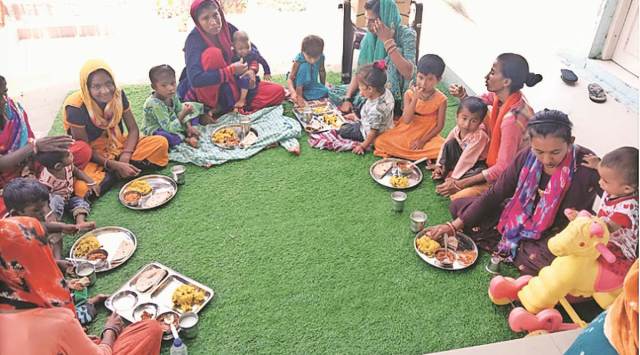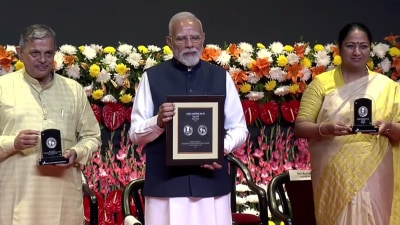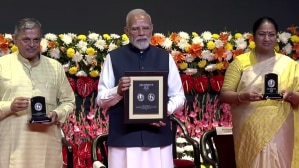Stay updated with the latest - Click here to follow us on Instagram
Poshan Rath takes nourishment to rural children
In rural areas, parents, most of whom were daily wage earners, could also not risk their income to attend to children’s nutritional needs.
 In another block, Khambaliya, private practitioners have been roped in with performance-linked incentives for SAM treatment under the ‘Bal Poshan’ scheme.
(Express)
In another block, Khambaliya, private practitioners have been roped in with performance-linked incentives for SAM treatment under the ‘Bal Poshan’ scheme.
(Express)A public-private partnership in three talukas of Devbhumi Dwarka district to address severe acute malnutrition (SAM) in children — Project Tushti — initially evoked lukewarm response as parents did not consider it a “disease”. In rural areas, parents, most of whom were daily wage earners, could also not risk their income to attend to children’s nutritional needs.
Addressing these concerns, Poshan Rath — mobile vans to reach out to children living in remote areas — was launched in January this year under this PPP initiative. Children, who require treatment, identified by the mobile van units as well as Rashtriya Bal Swasthya Karyakram (RBSK) teams, are picked up daily from their door-step and taken to two Child Malnutrition Treatment Centres (CMTCs) — one at sub-district hospital Dwarka and another at Bhanvad CHC — where they are given treatment for 14 days. The children are dropped back in the evening by the vans.
The aim is to screen children for SAM at early stage, said Dr Somen Saha, lead investigator of the project from Indian Institute of Public Health-Gandhinagar (IIPH-G), which is a partner in implementing the project along with the Gujarat government, JSI R&T Foundation and Nayara Energy in two blocks — Dwarka and Bhanvad. Through Poshan Rath, 866 children have been screened of whom 125 SAM children have been provided energy dense nutrition supplements in the past five months.
The CMTCs, equipped with six beds each, are supported in partnership with the district panchayat. An official involved with the project said on condition of anonymity that the need for screening by the mobile vans accompanied with a nutrition assistant was felt despite screening for SAM being primarily in the domain of RBSK teams of the government, was because admissions of SAM children remained low and parents often failed to understand the gravity.
“Sometimes you have to assure the parents that it is just a matter of 14 days following which their child can continue in good health,” the official said.
Dr Saha says that the two CMTCs now has 15 children for SAM treatment, more than their capacity. “We requested the officials if they can accommodate the children in their wards and they agreed. Approximately 28 children in the Bhanvad CMTC and 18 at Dwarka CMTCs have been treated so far, with demand increasing of late,” said Dr Saha. The vans go for screening after dropping the children at the CMTCs.
In another block, Khambaliya, private practitioners have been roped in with performance-linked incentives for SAM treatment under the ‘Bal Poshan’ scheme.







